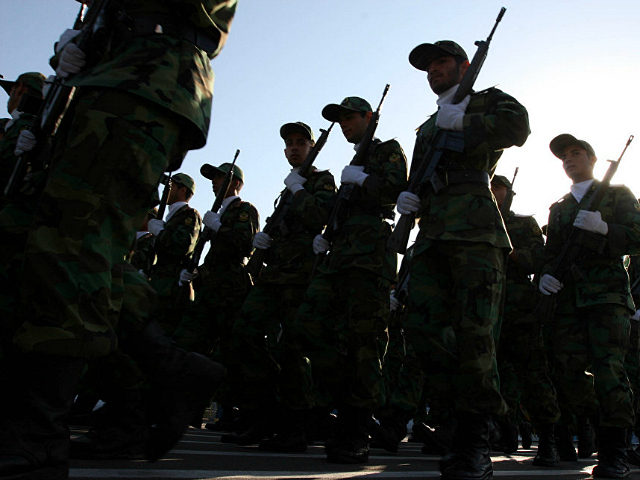The United States should capitulate to the Iranian demand to remove the hardline Islamic Revolutionary Guard Corps (IRGC) from its foreign terrorist organization list, according to a Foreign Policy magazine essay that admits doing so would alienate Middle East allies and that Iran can not be trusted to follow up on its promises.
In a piece published on Tuesday, Foreign Policy columnist Anchal Vohra claimed the time has come “to give the Revolutionary Guards a concession,” calling a revival of the Iranian nuclear deal “more important than the symbolism of a terrorist list.”
Vohra, who is also a freelance TV correspondent and commentator on the Middle East based in Beirut, warned that time was running out.
“Time is of the essence from the West’s perspective: In less than a month, Iran could possess uranium capable of making a nuclear bomb,” she wrote. “But sensing its advantage, Iran has been engaging in last-minute haggling.”
Iran has indicated it will not budge until the United States removes the Islamic Revolutionary Guard Corps from the Foreign Terrorist Organization list, but delisting the organization isn’t an attractive choice, FP columnist @anchalvohra writes.https://t.co/F2uKiW0SNp
— Foreign Policy (@ForeignPolicy) April 6, 2022
Noting there is “plenty of reason to be irritated” by Iran’s demand of the U.S. to remove the Islamic Revolutionary Guard Corps (IRGC) from the State Department’s Foreign Terrorist Organization (FTO) list — including what will be viewed as “the biggest insult of all” to Washington’s traditional allies in the Middle East, Vohra still expresses support for conceding.
Though delisting the organization “isn’t an attractive choice for any American president,” Vohra states, “dealing with Iran has never been about pleasant choices,” while suggesting the benefits of a restored nuclear deal “outweigh the costs of delisting the IRGC.”
Despite reports claiming Iran has “assured it would make a commitment to de-escalate in the region in return for the IRGC’s removal as a terrorist entity,” the author admits “there is no certainty it would follow up on that promise.”
Though the IRGC has been “empowered by the Ayatollahs to be used against moderate political and market forces in Iran to maintain their hegemony,” Vohra maintains their removal from the FTO list is merely a question of prestige and honor.
In January, Vohra described America’s Syria sanctions as essentially pointless.
Many took to Twitter to criticize the piece.
“Pattern: #Iranian regime makes outrageous demand; Biden Admin considers but receives pushback from both Dems & Republicans as #IRGC has American blood on their hands; Iranian regime plant makes the case for the Regime in an otherwise respectable outlet like @ForeignPolicy,” wrote Ellie Cohanim, a broadcast journalist who served as Deputy Special Envoy to Monitor and Combat Anti-Semitism at the United States Department of State.
Pattern: #Iranian regime makes outrageous demand; Biden Admin considers but receives pushback from both Dems & Republicans as #IRGC has American blood on their hands; Iranian regime plant makes the case for the Regime in an otherwise respectable outlet like @ForeignPolicy: pic.twitter.com/1SmcFgtxMv
— Ellie Cohanim (@elliecohanim) April 5, 2022
“Next thing @anchalvohra will be calling for giving concessions to Russia to get this terrible new Iran deal,” wrote former National Security Council (NSC) chief of staff and CIA official Fred Fleitz. “Oh wait, the Biden admin already agreed to this!”
“This headline is hard to believe. It’s not time to give #Iran’s IRGC a concession,” wrote Jason Brodsky, policy director for U.S. advocacy group United Against Nuclear Iran.
“It has earned its terrorism designations, it has plotted assassinations on U.S. soil, Iran is not just a nuclear file, & FTO list is not merely symbolic,” he added. “Unreal.”
“This gem is from a piece literally advocating IRGC appeasement,” wrote Hudson Institute Fellow Mohammed Alyahya
On Tuesday, Secretary of State Antony Blinken said the Revolutionary Guards is a terrorist organization, but responded to a question on whether they’ll remain one under a revival of the Iran nuclear deal by saying that he didn’t want to get into the details of talks.
Then-U.S. President Donald Trump’s administration designated the IRGC a terrorist organization in 2019.
Iran, the largest state sponsor of terrorism worldwide, claims its nuclear program is for energy purposes, but world leaders, including the six nations that joined the 2015 deal to limit Iran’s nuclear weapons capacity, say enriching uranium may lead to Iran’s ability to quickly create a nuclear weapon.
The Obama-led nuclear deal — deemed fatally flawed and highly one-sided by many, and from which then-President Donald Trump withdrew in 2018 — delineates an enrichment limit of 3.67 percent.
Iran has been accused of violating the agreement as Tehran produces more enriched uranium.
Nevertheless, current nuclear talks in Vienna may see the United States and other world powers provide Iran with economic sanctions relief in exchange for temporary restrictions on its nuclear program.
According to a former State Department official, President Biden’s impending agreement to restore the Iran nuclear deal offers the regime access to $90 billion in foreign currency reserves and sanctions relief to some of the world’s worst terrorists.
In addition to being granted hundreds of billions of dollars it will likely use for terror and aggression, the deal also will not prevent Iran from attaining nuclear weapons.
Last month, Russia’s envoy to the Iran nuclear talks admitted Tehran “got much more than it could expect” in the latest iteration of the nuclear deal.
Follow Joshua Klein on Twitter @JoshuaKlein.

COMMENTS
Please let us know if you're having issues with commenting.